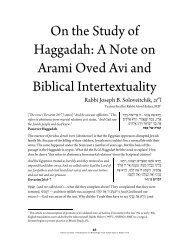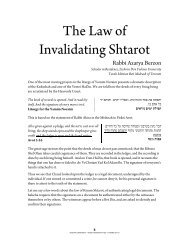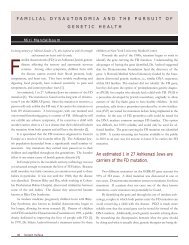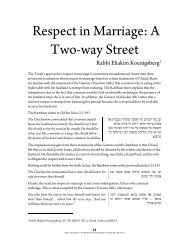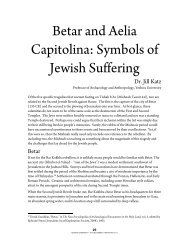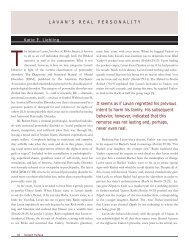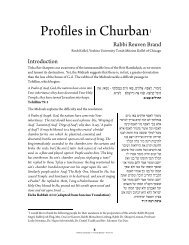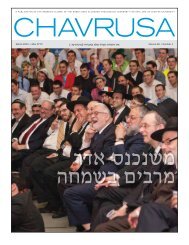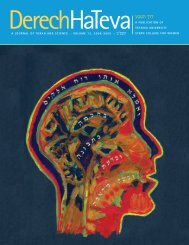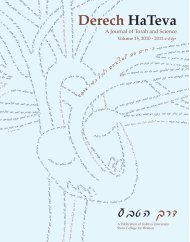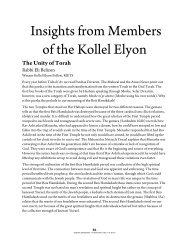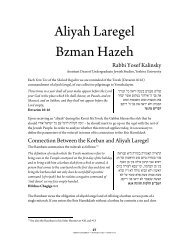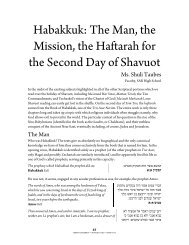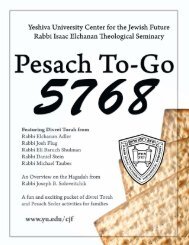YESHIVA UNIVERSITY • SUKKOT TO-GO ... - YU Torah Online
YESHIVA UNIVERSITY • SUKKOT TO-GO ... - YU Torah Online
YESHIVA UNIVERSITY • SUKKOT TO-GO ... - YU Torah Online
You also want an ePaper? Increase the reach of your titles
YUMPU automatically turns print PDFs into web optimized ePapers that Google loves.
There are dialogues in the Talmud that suggests a fascinating understanding of Mishneh <strong>Torah</strong>.<br />
The texts are extremely exciting and thoughtful, even while theologically challenging.<br />
And R. Levi says: Come and see that the attributes of God are<br />
not the attributes of man. God blessed Israel [in Vayikra] with<br />
twenty two verses and cursed them with eight [verses]. And<br />
Moshe our teacher [a man] blessed Israel [in Devraim] with<br />
eight verses and cursed them with twenty two [verses].<br />
Baba Batra 88b<br />
Abaya says: [interrupting the <strong>Torah</strong> reading of the<br />
admonitions by adding an aliyah is forbidden] in the Book of<br />
the Priests (Vayikra); but [during the reading of] the<br />
admonitions in Mishneh <strong>Torah</strong> (Devarim) [it is permitted] to<br />
interrupt. Why is there a difference? Those [in Vayikra] were<br />
said in the plural and Moshe recited them exactly as God<br />
stated. And those [in Devarim] are expressed in the singular<br />
and Moshe stated them himself.<br />
Megillah 31b<br />
18<br />
<strong>YESHIVA</strong> <strong>UNIVERSITY</strong> <strong>•</strong> <strong>SUKKOT</strong> <strong>TO</strong>-<strong>GO</strong> <strong>•</strong> TISHREI 5771<br />
אלש הארו אוב : יול יבר רמאו<br />
; םדו רשב תדמ ה"<br />
בקה תדמכ<br />
םירשעב לארשי ךרב ה"<br />
בקה<br />
… הנומשב ןללקו םיתשו<br />
ןכרב וניבר השמ וליאו<br />
םירשעב ןללקו הנומשב<br />
םיתשו<br />
: חפ ארתב אבב<br />
אלא ונש אל : ייבא רמא<br />
לבא , םינהכ תרותבש תוללקב<br />
. קסופ הרות הנשמבש תוללק<br />
ןושלב - וללה ? אמעט יאמ<br />
יפמ השמו , תורומא םיבר<br />
ןושלב - וללהו . ןרמא הרובגה<br />
ומצע יפמ השמו , תורומא דיחי<br />
ןרמא<br />
: אל הליגמ<br />
According to the Talmud the reason that the book of Devarim is called Mishneh <strong>Torah</strong> is that<br />
Mishneh <strong>Torah</strong> means it is a Second <strong>Torah</strong>. The book of Devarim is written by Moshe. In fact,<br />
the Zohar treats it the same way:<br />
This book [of Devarim] is called Mishneh <strong>Torah</strong><br />
because Moshe said it by himself.<br />
Va'etchanan no. 22<br />
ןרמא ומצע יפמ השמ הרות הנשמ ירקאד<br />
יאה<br />
בכ ןנחתאו<br />
What are the Talmud and Zohar trying to communicate? It seems that there are two models of<br />
“God Speak.” The first four books of the <strong>Torah</strong> are spoken by God and written by Moshe, and<br />
therefore the <strong>Torah</strong> is communicated in the third person. However, in the fifth book of the<br />
<strong>Torah</strong>, Sefer Devarim is spoken by Moshe, approved by God, and written by Moshe. Thus while<br />
Sefer Devarim is still choreographed by God, the role that Moshe plays is so much more<br />
significant. If the <strong>Torah</strong> is to be the eternal book that celebrates the covenantal relationship<br />
between God and the Jewish people, both participants must play active roles for the relationship<br />
to succeed.<br />
This lesson is not confined to Devarim. It is taught in the very first chapters of the <strong>Torah</strong>. When<br />
God creates the world and puts Adam and Chava into the Garden of Eden, Adam and Chava live<br />
passive existences and the relationship between man and God falters and flounders. The<br />
Garden’s existence leads man and woman to rebellion. Only later, when Adam and Chava are<br />
banished from the “idyllic environment” of Eden and are forced to struggle, do they attain a<br />
connection with God.



